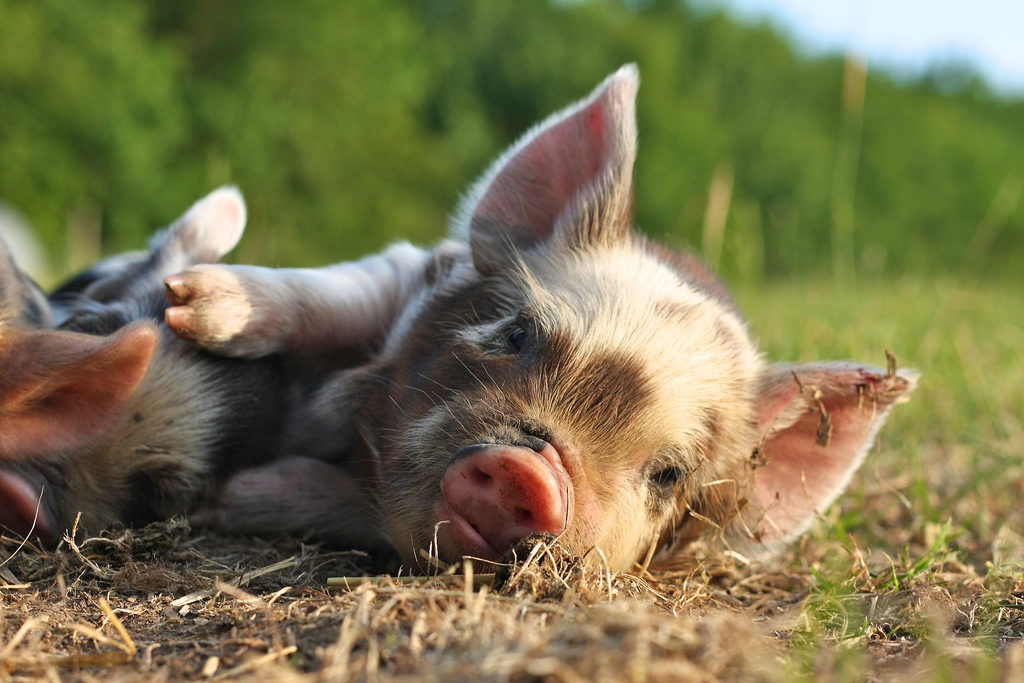Inspirirajuće: poljoprivrednik svinjetine postaje vegan i sada gaji povrće
Sve više i više poljoprivrednika vidi mogućnosti u biljnoj poljoprivredi, bez korištenja životinja. Jedan od najnovijih primjera je priča o švedskom Gustafu Soderfeldtu.

Godine 2006. Soderfeldt je započeo malu farmu svinja. Osjetio je način na koji su životinje strašno tretirane u industrijskim stočarstvima i želio je drugačije postupiti: manjeg opsega i poštujući životinje. Broj kupaca koji su željeli ‘životinjski ljubazno’ meso je značajno rastao, a tvrtka je bila uspješna. Ali Soderfeldt je shvatio da se sve više vrtjelo oko novca. Soderfeldt je rekao švedskom dnevniku:
“Naši kupci volili su čuti da su naše životinje imale ‘dobar život’ i kako je ‘životinjski ljubazno’ bilo naše meso. Ali nisu htjeli čuti ništa o strašnoj strani. Na primjer, nisam im mogao reći da se krmača uopće nije željela odvajati od svoje prasadi i da su svinje skvičale od straha kad su bile ukrcane na kamion koji bi ih doveo u klaonicu. Jedini način da zadržim svoje klijente bio je skrivanjem istine i moj život kao poljoprivrednik svinja osjećao se dan za danom manje fer.
Većina naših kupaca su kod nas kupovali meso da bi umirili svoju savjest. Ljudi ne žele priznati da podržavaju industriju koja tretira životinje na strašan način. Zato kupuju ‘životinjski ljubazno’ meso. Otkrio sam da mi je sve teže bilo služiti kao plakat za mesnu industriju. ”
Veganstvo je budućnost poljoprivrede
Kad je Soderfeldt stupio u kontakt s veganstvom preko YouTubea, shvatio je da ‘životinjski ljubazno’ meso uopće ne postoji. On je prije četiri godine shvatio da vegani zapravo žele istu stvar kao i on: da te životinje imaju dobar život. Uostalom, to je bio izvorni pristup njegove farme. Ali vegani idu korak dalje: ako vam je doista stalo do životinja, nećete ih uopće ubijati. Soderfeldt je također smatrao da ljudi moraju jesti meso kako bi bili zdravi, ali naučio je da to nije istina.
On i njegova supruga postaju vegani, prestaju držati životinje i prebacuju se na uzgoj povrća bez uporabe životinjskih proizvoda kao što su krvno brašno, koštano brašno ili životinjska gnojiva. Mijenjanje nije bio lako i izgubili smo gotovo sve svoje kupce. No, nakon četiri godine njegova tvrtka raste, uključujući rajčicu, krumpir, grah, grašak, salatu, mrkve, luk, ugljen i cvijeće. Prodaju ih kroz razna poljoprivredna tržišta i preko pretplata na povrće.
Soderfeldt je uvjeren da je veganstvo budućnost poljoprivrede i “mirnije, zdravije, učinkovitije, manje rasipno i ekološki prihvatljivije” od stočarske poljoprivrede.
Increasingly more farmers see opportunities in vegetable agriculture, without the use of animals. One of the most recent examples is the story of the Swedish Gustaf Soderfeldt.

In 2006, Soderfeldt set up a small-scale pig farm. He believed that the way animals were treated in industrial animal farming was horrific and he wanted to do it differently: small-scale, with respect for animals. The number of customers that wanted his ‘animal-friendly’ meat grew considerably and the company was a great success. But Soderfeldt realised that it increasingly came down to money. Soderfeldt told a Swedish newspaper:
“Our customers liked to hear that our animals had lived a ‘good life’ and how ‘animal-friendly’ our meat was. But they didn’t want to hear about the bad side. For example, I couldn’t tell them that a sow didn’t want to be separated from her piglets at all and that the pigs screamed with fear when they were loaded onto the truck to bring them to the slaughterhouse. The only way to keep my customers was to conceal the truth and my life as a pig farmer felt less honest every day.
Most of our customers bought their meat with us to ease their conscience. People don’t want to admit that they support an industry that treats animals horribly. That’s why they buy so-called ‘animal-friendly meat’. It became more and more difficult for me to promote the meat industry.”
Veganism is the future of agriculture
When Soderfeldt came into contact with veganism via YouTube he realised that ‘animal-friendly’ meat doesn’t exist at all. He copped on four years ago and realised that vegans wanted in fact the same thing as he did: animals living a good life. After all, that was originally the concept for his farm. But vegans go even one step further in this: if you really care for animals you won’t kill them at all. Soderfeld also used to think that people needed to eat meat to stay healthy but he soon learned that that wasn’t true.
He and his wife became vegans, stopped keeping animals and changed to growing vegetables, without the use of animal products such as blood meal, bone meal or animal manure. The transition was not easy and they lost almost all of their customers. But after four years the company is back on its feet and they now grow tomatoes, potatoes, beans, peas, lettuce, carrots, onions, cabbages and flowers among others. The sell them on various farmer markets and via vegetable subscriptions.
Soderfeldt is convinced that veganism is the future of agriculture and that it is ‘peaceful, healthier, more efficient, less wasteful and more environment-friendly’ than animal agriculture.